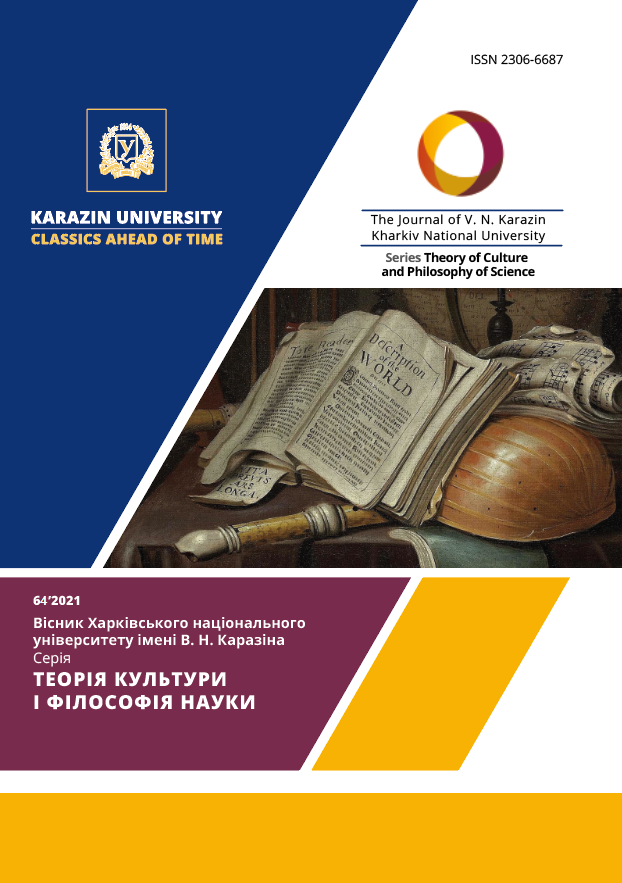PHILOSOPHY AS AN AGORA OF CULTURAL DIALOGUE: MEETING OF MARTIN HEIDEGGER AND PAUL CELAN
Abstract
Philosophy as poetry and praxis, as agora of cultural dialogue is considered. Based on hermeneutic analysis of one of Paul Celan’s poems (“Todtnaubeg”), the possibity of a dialogue between twentieth‐century philosophy (Martin Heidegger) and twentieth‐century poetry (Paul Celan) in the agora of public philosophizing has been established. Paul Celan was comforted by philosophy (euphrasia). It turns out that philosophy is always more than philosophers, this is the main lesson learnt by the author of the poem “Todtnaubeg”. It is shown that anthropological issues are always broader than individual discourses, although even in individual works (treatise, poem) we can find a whole rang of such discourses.
The poet dedicates poem "Todtnaberg" to the turning point in his life and development of twentieth‐century philosophy (meeting with the most famous and influential twentieth‐century philosopher Martin Heidegger).
Philosophy is seen as a complex combination of poetry and praxis, diverse discourses, as a place of cultural dialogue and a therapy for cultural trauma. Paul Celan needed such consolation (euphrasia) by philosophy, and he received it from philosophy and philosophical communication in general, and not from Martin Heidegger (the reasons for distortion of communication and integrity of dialogical discourse are considered).
Unfortunately, Heidegger himself was not always ready for such a dialogue, but his philosophy acts on his behalf, complementing the words of poetry, the very situation of an agora is based on freedom of philosophical thought, at the top of Mountain of the Dead or the Magic Mountain, the main thing is that they maintain humanity and openness to the Other Voice which can be heard from any top.
Language provides an opportunity not only to express but also to create ‐ to reproduce the unity of the world, unity of the sacred and being, meaning of the Logos significantly deepens both the philosophy of language and the theory of performativity in the creative, therapeutic function of the Word. Logos imparts truth and comprehensiveness to the statement. This provides an opportunity for not an objective but an ontological identity which through the word reveals the unity of being, overcomes its rupture and trauma.
Downloads
References
Bednarsk, M. (2020). Moral of the Novel: Rorty and Nussbaum on the Ethical Role of Literature. Eidos. A Journal for Philosophy of Culture. Vol. 4. no.4. Pp.175‐189, DOI: https://doi.org/10.14394/eidos.jpc.2020.0046 (In English)
Bollak, J. (2006). Dichtung wider Dichtung: Paul Celan und die Literatur. Gottingen: Wallstein, 2006. 535 s. (In German).
Caruth, C. (2016). Unclaimed Experience: Trauma, Narrative and History. Baltimore: John Hopkins University Press, 2016. 208 p. (In English)
Celan, P. (2006). Poems. Prose. Letters. Edited by M. Belorusets. Moscow: Ad Marginem Press, 2008. Pp. 236‐706. (In Russian).
Celan, P. (2018). Light Forcing. Poems. Celan Paul. Lichtzwang, trans. from German, preface P. Ryhlo. Chernivtsi: XXI, 2018. 228 p. (In Ukrainian, In German).
Dalaqua, G. H. (2020) Aesthetic injustice. Journal of aesthetics and culture. Vol. 12. Рр.1‐2, DOI: https://doi.org/10.1080/20004214.2020.1712183 (In English)
Gadamer, H.‐G. (2007). Martin Heidegger‐85. Path Martin Heidegger: exploration of late creativity of Martin Heidegger. Minsk: Propilei, 2007. Pp.122‐138. (In Russian).
Gumbrecht, G.U. (2020). Production of Presence. What value cannot convey, trans. from English. Kharkiv: IST Publising. 186 p.
Heidegger, M. (1991). Conversation on a country road, trans. from German. Moscow: High School, 1991. 192 p. (In Russian).
Heidegger, M. (1993). Time and life. Articles and reports, trans. from German. Moscow: Republic. 447 p. (In Russian).
Heidegger, M. (2003). Hölderlin and the essence of Poetry, trans. G. Notkin from German. Heidegger, M. Explanation of Hölderlin’s Poetry. St. Petersburg: Academic Project. Pp.63‐98. (In Russian).
Heidegger, M. (2006). Nietzche, trans. from German. Vol.1. St. Petersburg: Vladimir Dal’, 2006. 608 p. (In Russian).
Koval, O.A., Kryukova, E.B. (2020). Todtnauberg Celana: a sample of a conversation between philosophy and poetry. Tomsk State University Bulletin. Philology. no 64. Pp.196‐219. (In Russian).
Laku‐Labart, F. (2015). Poetry as an experience, trans. from French N. Mavlevich. Moscow: Three squares. 192 p. (In Russian).
Lemke, A. (2002). Konstellation ohne Sterne: zur poetischen und geschichtlichen Zasur bei Martin Heidegger und Paul Celan. Munchen: Fink, 2002. 596 s. (In German).
Ricoeur, P. (1996). Hermeneutics and Psychoanalysis. Religion and Faith, trans. from French, afterword, notes I.S. Vdovina. Moscow: Art. 270 p. (In Russian).
Sharpe, M. A. (2021). Good Person for a Crisis? On the Wisdom of the Stoic Sage (in Himself&for Us). Eidos. A Journal for Philosophy of Culture. Vol. 5. no.1. Pp. 32‐49, DOI:
Wilburn, R. (2021). What is the Relation between Semantic and Substantive Epistemic Contextualism?. Logos&Episteme. Vol. XII, no.3. Pp. 344‐366. (In English).
Citations
B.WALDENFELS'S RESPONSIVE TOPOGRAPHY OF FOREIGNNESS: ART'S RESPONSES TO CONTEMPORARY CHALLENGES
Tytar Olena & Alimova Viktoriia (2023) The Journal of V. N. Karazin Kharkiv National University, Series "The Theory of Culture and Philosophy of Science"
Crossref




